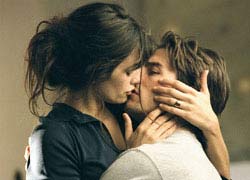"But where shall I start? The world is so fast, I shall start with the country I know best, my own. But my country is so very large, I had better start with my town. But my town, too, is large. I had best start with my street. No, my home. No, my family. Never mind, I shall start with myself."
- Elie Wiesel
Sounds easy, right? Ha. Here's what the modern adult struggle for existential freedom might look like on a hypothetical continuum...
Existential Freedom
<------------------------------------------------------>
Powerless Self-Empowered Overburdened
Powerless: On one end of the spectrum, we become overwhelmed by the world's larger forces. We may constantly go along with whatever our culture, the television, our friends, and our families are doing. We may forget to take the time to identify our own identity, our own values, and act accordingly.
Overburdened: On this end of the spectrum, we actually develop a delusion of having too much power and control. We take personal responsibility for all of the world's problems. We may become depressed by the actions of others, whether they be our family members, state and national politics, or global issues. And yet, the problem is ultimately with us. We are taking on too much personal responsibility for the rest of humanity. We must remember that we cannot control the actions of other people. All we can do is take responsibility for ourselves, and do the best that we can.
Self-Empowered: The ideal relationship with our freedom, I would argue, would be some place right in the middle. In this ideal state, we take responsibility for the role we play in our relationships, the work we produce at our jobs, and the way we respond to our problems. And yet, we let go of those things we can't control. We realize that we are not at fault for the experiences of injustice that we suffer. We accept that we cannot control the actions of others. And we play our small part in impacting the big global issues that face humanity without carrying the weight of these problems on our shoulders.
How each individual reaches this ideal self-empowered state, I can't say. We each inevitably have our own challenges, and our own path towards improvement. I am able, however, to speak about my own challenges in this area. So keep an eye out for some upcoming posts on my own struggles with feeling both powerless and overburdened. Until then, thanks for reading.







